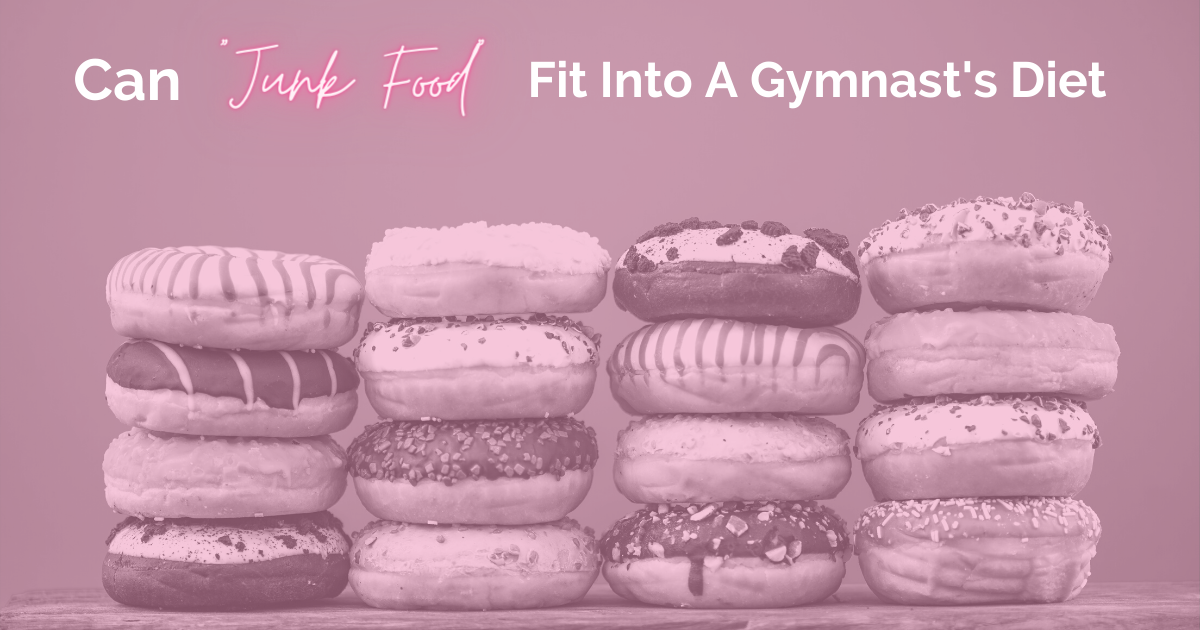explore the blog
free training
The Podcast
Learn to fuel the gymnast for optimal performance and longevity in the sport.
How to Fuel the Gymnast
Learn how to fuel your gymnast so that you can avoid the top 3 major nutrition mistakes that keep most gymnasts stuck, struggling, and injured.
looking for...?
I didn’t used to believe this, but that was also at a time where I was “paleo” and yet binging on 90% dark chocolate and coconut butter because I was mentally so deprived of food that actually tasted good and brought satisfaction. I was trying so hard to “get lean”, yet my efforts only backfired.
When I started relaxing my “food rules” and eating what I wanted (in moderation), my body naturally settled out to where it wanted which was less than the 30+ pounds I had gained in college during the crazy dieting. Read more of my store here.
These days, there are several words like “carbs”, “sugar”, “gluten”, and “dairy” that get a bad rap in our society. Technically speaking, sugar is the simplest form of carbohydrates which are critical for the body and its preferred fuel source. Eliminating carbs from your diet will leave you sluggish, at risk for nutrient deficiencies, and is practically impossible without becoming neurotic about food.
Gluten, a protein, is the part of wheat that individuals with Celiac disease will have an autoimmune response to. This autoimmune response leads to damage of the small intestine and can lead to weight loss, nutrient deficiencies, malabsorption, and stunted growth. For healthy individuals without celiac disease, there is no evidence to support any health benefit from eliminating gluten from the diet. Now, you say “but yeah, I know someone who lost X many pounds by going gluten free!”
Here’s the deal…Despite what “nutritionists” tell you about sugar/clean eating and other “bad foods”, energy balance is the ONE of the determinates of weight.
It’s more complicated than “Calories In, Calories Out”, but energy balance still matters.
Any diet “works” because if you’re in a caloric deficit (eating less than you need), your body will use fat and muscle tissue for energy which leads to “weight loss”. Again, this is an oversimplification but hopefully you get the picture.
It’s important to note that weight and body composition are not synonymous. An athlete can weigh the exact same and yet have a very different “look” thanks to shifts in body composition (Fat vs Muscle vs Bone).
For many athletes, trying to avoid “junk food” at all costs only leads to a distorted relationship with food that lands them somewhere along the binge/restrict spectrum.
For the athlete that feels like “they can’t stop eating junk food”, I’d first examine their diet and make sure they are eating enough. Hunger can lead to craving for junk food (or any food for that matter), and often these athletes are under fueling. Three meals per day and 1-2 snacks (including pre-workout/intraworkout strategies) is a good starting place to keep the gymnast nourished. In terms of the “junk foods”, the 90/10 rules guides that 1-2 servings of “fun foods” or “junk foods” per day is consistent with moderation and can be part of a balanced diet. This could be a small cup of ice cream after dinner and a normal serving of chips with lunch. There are no rules to how the “fun foods” can be enjoyed.
One meal or snack is not going to ruin your health or your practice. A nutritionist I know has a video of gymnasts falling of the beam after eating “junk food” before practice, but it doesn’t work like that. No, chips are not the best idea before practice because their high fat content will slow the carbohydrate (from the potatoes) from getting into the bloodstream and to the muscles. That could be the reason a gymnast would feel “sluggish” after eating “junk food” before practice, not because the food is inherently “bad” or has some magical powers that kills performance.
The first step you can take as a parent to help your children with junk food is serve it regularly. By offering dessert with dinner (at the same time), you’re teaching the child that no food is “on a pedestal”. The “junk food” or “fun foods” should be offered enough that the child begins to trust these will be available. Children who “can’t stop eating” the junk foods are often over-restricted AND/OR may not provided with a consistent meal/snack schedule. Obviously this can be more complicated for some families that I’ve made it, but lessening the restriction is a starting place.
on the blog
